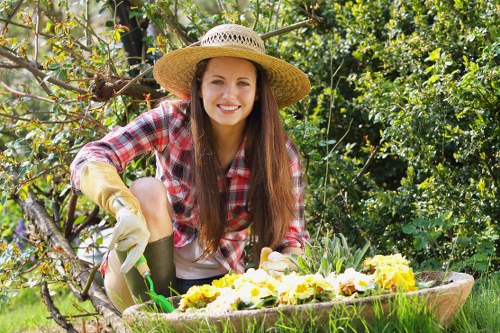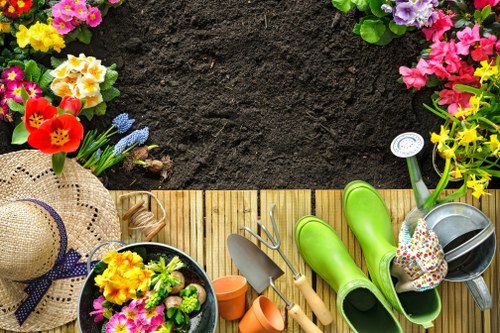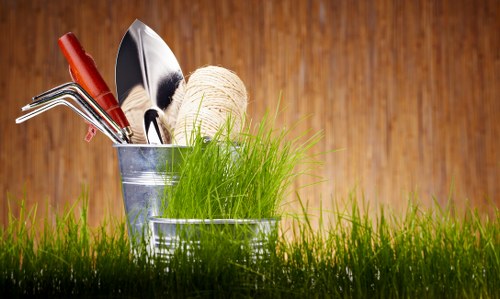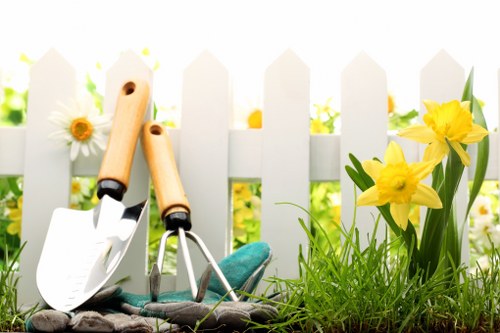Comprehensive Guide to Garden Maintenance in Charlton

Introduction to Garden Maintenance
Maintaining a beautiful garden in Charlton requires dedication, knowledge, and the right techniques. Whether you are a seasoned gardener or a beginner, understanding the fundamentals of garden maintenance can help you create a thriving outdoor space. This guide covers essential aspects of garden care, from seasonal tasks to soil health, ensuring your garden remains vibrant and healthy year-round.
Charlton's unique climate and soil conditions present both opportunities and challenges for gardeners. By tailoring your maintenance practices to these specific conditions, you can enhance plant growth, prevent common issues, and achieve a picturesque garden that stands out in the community.
In this article, we will explore various strategies and tips for effective garden maintenance in Charlton, including plant selection, watering schedules, pruning techniques, and pest control methods. Implementing these practices will not only improve the aesthetic appeal of your garden but also contribute to its sustainability and resilience.

Seasonal Garden Maintenance
Spring Care
Spring is a crucial time for garden maintenance in Charlton, as it sets the foundation for the growing season. Start by clearing any debris that accumulated over winter, such as fallen leaves and dead plant material. This helps prevent the spread of diseases and pests, ensuring a healthier garden environment.
Preparing the soil is essential during spring. Perform a soil test to determine pH levels and nutrient content, allowing you to amend the soil appropriately. Adding compost or organic matter can enhance soil structure, drainage, and fertility, providing a rich medium for plant roots to thrive.
Planting new specimens, such as perennials, shrubs, and trees, should be done carefully. Choose species that are well-suited to Charlton's climate and soil conditions. Proper spacing and placement ensure adequate air circulation and sunlight exposure, which are vital for robust growth.
Summer Maintenance
During the summer months, maintaining adequate moisture levels is critical. Implement a consistent watering schedule, preferably in the early morning or late evening, to minimize water loss through evaporation. Using drip irrigation systems can provide efficient and targeted watering, reducing waste and ensuring plants receive the moisture they need.
Regular weeding is necessary to prevent competition for nutrients and water. Hand-pulling weeds or using mulch can help suppress unwanted growth and maintain a tidy garden appearance. Additionally, applying a layer of mulch can help regulate soil temperature and retain moisture, benefiting your plants throughout the hot months.
Pruning and deadheading flowering plants encourage continuous blooms and remove any damaged or diseased parts. Proper pruning techniques vary depending on the plant species, so familiarize yourself with the specific requirements of your garden's flora to avoid unintentional harm.

Autumn and Winter Care
Autumn Tasks
As temperatures begin to drop, autumn becomes a time for preparing your garden for the winter ahead. Start by removing spent annuals and any remaining perennials that are prone to disease. This cleanup helps maintain garden hygiene and reduces the risk of overwintering pests.
Planting cover crops, such as clover or rye, can protect and enrich the soil during the colder months. These plants prevent erosion, add organic matter, and fix nitrogen, enhancing soil fertility for the next growing season.
Mulching is also beneficial in autumn, as it provides insulation against frost and helps retain soil moisture. Use materials like straw, shredded leaves, or bark chips to create a protective layer around plants and tree bases.
Winter Maintenance
Winter garden maintenance focuses on protecting plants from extreme cold and preparing your garden for spring renewal. In Charlton, occasional frosts can damage sensitive plants, so applying frost blankets or covers during cold spells is advisable.
Prune deciduous trees and shrubs in late winter before new growth begins. This timing minimizes stress on the plants and allows for better recovery. Remove any dead or weak branches to promote healthy structure and reduce the risk of breakage under snow or ice weight.
Ensure that garden tools are properly stored and maintained during the winter months. Clean and sharpen blades to prevent rust and ensure they are ready for use in the spring. Organizing your tools also prolongs their lifespan and keeps your garden workspace efficient.

Soil Health and Fertilization
Understanding Soil Composition
A healthy garden starts with well-prepared soil. Understanding Charlton's soil composition is essential for selecting appropriate plants and amendments. Conducting a soil test provides valuable insights into pH levels, nutrient content, and soil texture, guiding your fertilization and soil improvement efforts.
Amending the soil with organic matter, such as compost or well-rotted manure, enhances its structure and fertility. Organic amendments improve drainage in clay soils and increase water retention in sandy soils, creating an optimal environment for plant roots.
Maintaining soil health also involves preventing erosion and compaction. Implementing ground covers, mulching, and avoiding heavy machinery in garden beds can preserve soil integrity and support beneficial microbial activity.
Fertilization Practices
Fertilizing your garden in Charlton requires a balanced approach to provide plants with essential nutrients without causing excess buildup. Use slow-release fertilizers to ensure a steady supply of nutrients over time, reducing the risk of over-fertilization and leaching.
Organic fertilizers, such as bone meal, blood meal, and fish emulsion, are excellent choices for sustainable garden maintenance. These natural options improve soil fertility and support beneficial soil organisms, promoting long-term plant health.
It's important to fertilize at the right times to coincide with plant growth cycles. Typically, fertilizing in early spring and mid-summer aligns with periods of active growth, ensuring that plants receive the necessary nutrients when they need them most.

Pest and Disease Management
Identifying Common Pests
Pests can pose significant challenges to garden maintenance in Charlton, causing damage to plants and reducing yields. Common garden pests include aphids, slugs, snails, and caterpillars. Early identification and intervention are key to managing pest populations effectively.
Regularly inspect your plants for signs of pest infestation, such as chewed leaves, sticky residues, or the presence of insects. Using integrated pest management (IPM) strategies can help control pests while minimizing environmental impact.
Natural predators, like ladybugs and lacewings, can be encouraged to inhabit your garden, providing biological control of pest populations. Additionally, using barriers, such as copper tape or diatomaceous earth, can deter pests from reaching your plants.
Managing Plant Diseases
Plant diseases, including fungal infections and bacterial wilt, can compromise garden health and productivity. Maintaining proper sanitation by removing diseased plant material and ensuring good air circulation helps reduce the incidence of diseases.
Using disease-resistant plant varieties is another effective strategy for preventing common ailments. Selecting plants bred for resistance to specific diseases can lessen the need for chemical interventions and promote a healthier garden ecosystem.
Applying appropriate fungicides or bactericides when necessary can control disease spread. However, it's important to use these treatments judiciously, following label instructions and considering the environmental impact.
Efficient Watering Techniques
Establishing a Watering Schedule
Effective watering is fundamental to garden maintenance in Charlton. Establishing a regular watering schedule ensures that plants receive consistent moisture without overwatering, which can lead to root rot and other issues.
The frequency and amount of water required depend on various factors, including plant types, soil conditions, and weather patterns. During hotter months, plants may need more frequent watering, while in cooler periods, less water is necessary.
Monitoring soil moisture levels helps determine when to water. Inserting a soil moisture meter or simply feeling the soil a few inches below the surface can provide indicators of when plants need hydration.
Water Conservation Practices
Implementing water conservation practices not only benefits the environment but also reduces water bills and promotes sustainable garden maintenance. Utilizing rain barrels to collect and store rainwater for irrigation is an effective way to harness natural resources.
Mulching plays a dual role in water conservation by retaining soil moisture and reducing evaporation. Organic mulches, such as straw or wood chips, break down over time, enriching the soil and supporting beneficial microorganisms.
Drip irrigation systems deliver water directly to the plant roots, minimizing waste and ensuring efficient moisture distribution. These systems can be automated with timers, providing consistent watering without the need for manual intervention.
Pruning and Trimming Techniques
Importance of Pruning
Pruning is a vital component of garden maintenance in Charlton, promoting healthy growth, improving plant shape, and enhancing overall garden aesthetics. Regular pruning removes dead or diseased branches, allowing plants to allocate energy to new growth.
Different plant species require specific pruning techniques. For example, fruit trees benefit from annual pruning to encourage fruit production, while flowering shrubs may need deadheading to promote continuous blooms.
Understanding the appropriate timing for pruning is essential. Pruning too late in the season can stimulate new growth that may be damaged by frost, while pruning too early can interfere with natural growth cycles.
Tools and Techniques
Using the right tools ensures effective and safe pruning practices. Sharp, clean tools reduce the risk of damaging plants and prevent the spread of diseases. Common pruning tools include pruning shears, loppers, and pruning saws.
When pruning, make clean cuts at a slight angle above a bud or branch junction. This technique encourages proper healing and minimizes the potential for disease entry. Avoid leaving large stubs, as they can become entry points for pests and pathogens.
After pruning, dispose of the clippings responsibly. Composting healthy plant material enriches the soil, while disposing of diseased or pest-infested material reduces the risk of spread.
Landscaping and Design Tips
Plant Selection and Arrangement
Choosing the right plants is crucial for successful garden maintenance in Charlton. Select plant species that are well-suited to the local climate, soil conditions, and available sunlight. Native plants are often a good choice, as they are adapted to the environment and require less maintenance.
Consider the mature size and growth habits of plants when arranging your garden. Proper spacing ensures adequate air circulation, reduces competition for resources, and prevents overcrowding, which can lead to disease and pest issues.
Incorporate a mix of perennials, annuals, shrubs, and trees to create a diverse and resilient garden ecosystem. Layering plants with varying heights and textures adds visual interest and supports a range of wildlife.
Design Principles
Applying fundamental design principles can enhance the beauty and functionality of your garden. Balance elements by distributing plants and structures evenly, creating a harmonious appearance. Contrast can be achieved through varying colors, shapes, and foliage to add depth and intrigue.
Focal points, such as a specimen tree, a water feature, or a garden sculpture, draw the eye and provide a central theme for your garden design. Pathways and borders guide movement through the garden, defining spaces and adding structure.
Incorporating sustainable design practices, such as using native plants, conserving water, and promoting biodiversity, contributes to environmental health and reduces maintenance efforts. A thoughtfully designed garden not only looks appealing but also supports a thriving ecosystem.
Mulching and Weed Control
Benefits of Mulching
Mulching is a key aspect of garden maintenance in Charlton, offering numerous benefits for plant health and garden aesthetics. A layer of mulch helps retain soil moisture, reducing the need for frequent watering and ensuring that plants receive a consistent supply of water.
Mulch acts as a barrier against weeds, suppressing their growth by blocking sunlight and limiting their access to essential resources. This reduces the time and effort required for weeding, allowing you to focus on other maintenance tasks.
Organic mulches, such as shredded leaves, straw, or wood chips, decompose over time, enriching the soil with nutrients and improving its structure. Inorganic mulches, like gravel or rubber, provide long-lasting weed control and can be beneficial in specific garden settings.
Effective Weed Management
Controlling weeds is essential for maintaining a healthy and attractive garden. Weeds compete with cultivated plants for nutrients, water, and light, potentially stunting their growth and reducing yields.
Implementing a combination of mechanical, chemical, and cultural methods can effectively manage weed populations. Manual removal, such as hand-pulling or hoeing, is effective for small-scale weed control, while larger infestations may require more intensive strategies.
Preventative measures, such as using landscape fabric or laying down a thick layer of mulch, can significantly reduce the likelihood of weed establishment. Regular monitoring and early intervention help keep weed populations in check, ensuring that your garden remains healthy and productive.
Composting and Waste Management
Benefits of Composting
Composting is an environmentally friendly practice that plays a significant role in garden maintenance in Charlton. By recycling organic waste, such as kitchen scraps, garden clippings, and fallen leaves, composting creates a rich, nutrient-dense amendment that enhances soil fertility and structure.
Using compost in your garden reduces the need for chemical fertilizers, promoting a more sustainable and eco-friendly approach to plant nutrition. Additionally, compost improves soil aeration and water retention, creating optimal conditions for root development and microbial activity.
Moreover, composting helps reduce the volume of waste sent to landfills, contributing to waste management efforts and lowering your environmental footprint.
Setting Up a Compost System
Establishing an efficient compost system is straightforward and can be tailored to your garden's needs. Start by designating a compost area that is easily accessible and receives partial sunlight, which aids in the decomposition process. Use a compost bin or create a simple pile using wooden pallets or wire mesh to contain the materials.
Balance carbon-rich materials (browns) like dry leaves and straw with nitrogen-rich materials (greens) such as vegetable scraps and fresh grass clippings. Proper layering and turning of the compost pile facilitate aeration and accelerate decomposition.
Monitor the moisture levels of your compost, keeping it damp but not waterlogged. Maintaining the right conditions ensures efficient breakdown of organic matter and prevents unpleasant odors. Regularly add new materials and turn the pile to incorporate air, promoting a healthy composting environment.
Tools and Equipment for Garden Maintenance
Essential Gardening Tools
Having the right tools makes garden maintenance in Charlton more efficient and enjoyable. Essential gardening tools include:
- Pruning Shears: For trimming and shaping plants, as well as removing dead or diseased branches.
- Garden Fork: Useful for turning soil, aerating garden beds, and incorporating organic matter.
- Watering Can or Hose: Essential for delivering water to plants, especially in areas without automated irrigation systems.
- Gloves: Protect your hands from thorns, rough stems, and soil-borne pathogens while working in the garden.
- Spade: Ideal for digging, planting, and moving soil or compost.
Advanced Equipment
For larger gardens or more intensive maintenance tasks, advanced equipment can be beneficial:
- Lawn Mower: Keeps your lawn neat and promotes healthy grass growth by maintaining an optimal height.
- String Trimmer: Useful for trimming grass and weeds in areas that are difficult to reach with a mower.
- Wheelbarrow: Facilitates the transport of soil, compost, plants, and tools around your garden.
- Power Tools: Such as hedge trimmers or leaf blowers, can save time and effort on larger maintenance tasks.
- Compost Turner: Automates the turning process, ensuring your compost stays aerated and decomposes efficiently.
Creating a Sustainable Garden
Sustainable Practices
Adopting sustainable gardening practices ensures that your garden in Charlton remains healthy and productive while minimizing environmental impact. Sustainable practices include conserving water, reducing chemical use, and promoting biodiversity.
Incorporate native plants and pollinator-friendly species to support local wildlife and create a balanced ecosystem. These plants are adapted to the local environment, requiring less maintenance and resources while providing habitat and food for beneficial insects and animals.
Implementing techniques such as crop rotation, companion planting, and natural pest control enhances garden resilience and reduces dependency on external inputs, fostering a more self-sustaining garden environment.
Benefits of Sustainability
Sustainable gardening not only benefits the environment but also improves the overall health and productivity of your garden. By reducing water usage and enhancing soil health, plants become more resilient against stressors such as drought and pests.
Minimizing the use of synthetic chemicals fosters a safer environment for both humans and wildlife, reducing the risk of pollution and promoting healthier growth. Sustainable practices also contribute to the longevity of your garden, ensuring it remains a beautiful and viable space for years to come.
Moreover, a sustainable garden can serve as a model for community and environmental stewardship, inspiring others in Charlton to adopt eco-friendly gardening methods and contribute to a greener, healthier town.
Conclusion
Effective garden maintenance in Charlton involves a combination of knowledge, planning, and consistent effort. By understanding the unique conditions of your garden, implementing seasonal care routines, and adopting sustainable practices, you can create and maintain a thriving outdoor space that brings beauty and joy throughout the year.
Remember to invest in the right tools, prioritize soil health, and manage pests and diseases proactively to ensure your garden remains vibrant and resilient. Whether you're cultivating a small backyard garden or managing a larger landscape, these strategies will help you achieve a successful and sustainable garden in Charlton.
Embrace the art of garden maintenance and enjoy the rewarding experience of nurturing a green sanctuary that enhances your living environment and contributes to the natural beauty of Charlton.
Get Started with Your Garden Maintenance Today!
Ready to transform your garden in Charlton? Contact us today to book your garden maintenance service and take the first step towards a flourishing outdoor space.
